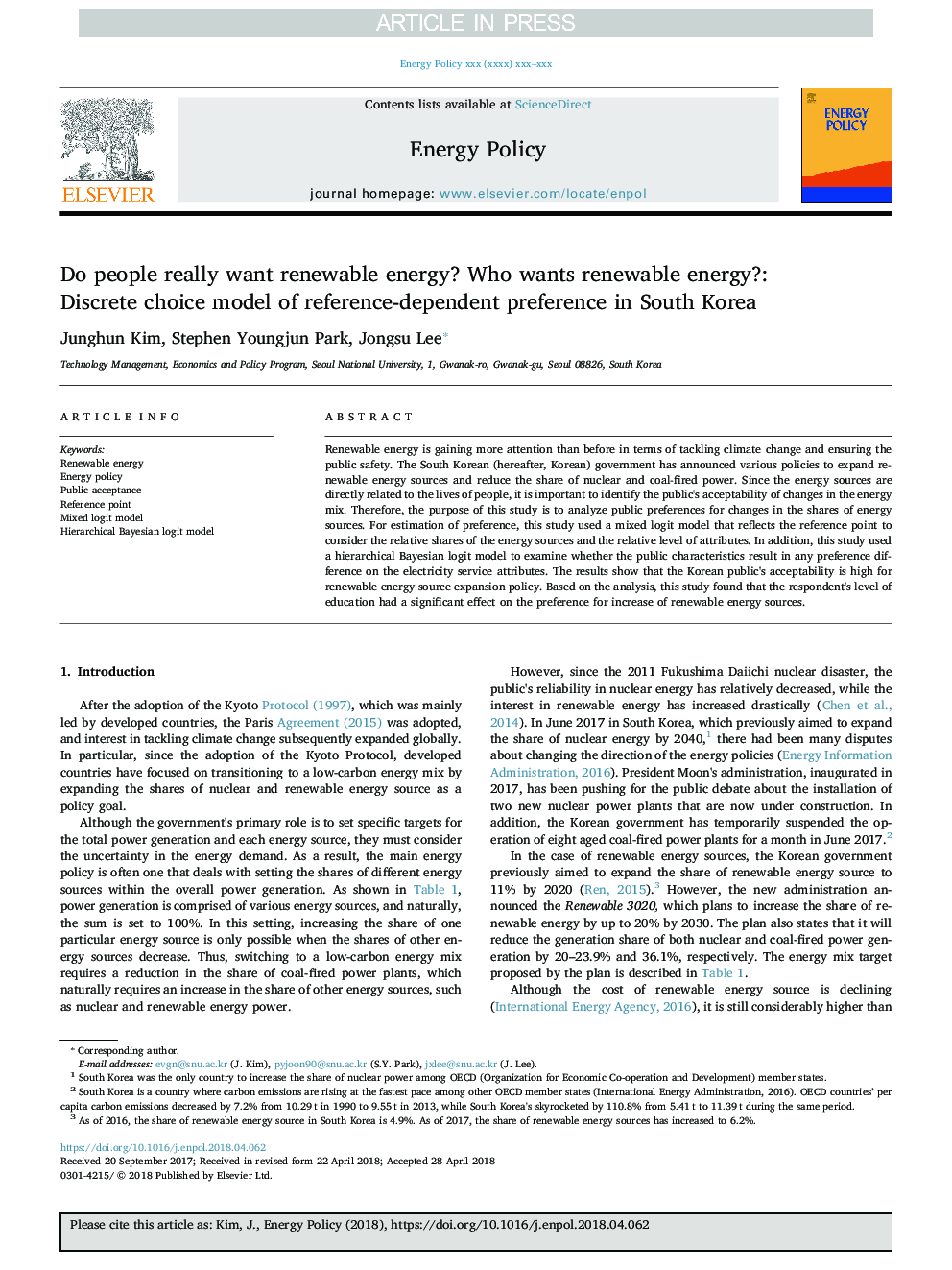| کد مقاله | کد نشریه | سال انتشار | مقاله انگلیسی | نسخه تمام متن |
|---|---|---|---|---|
| 7397276 | 1481238 | 2018 | 10 صفحه PDF | دانلود رایگان |
عنوان انگلیسی مقاله ISI
Do people really want renewable energy? Who wants renewable energy?: Discrete choice model of reference-dependent preference in South Korea
ترجمه فارسی عنوان
آیا مردم واقعا انرژی تجدید پذیر را می خواهند؟ چه کسی انرژی های تجدیدپذیر را می خواهد؟: مدل انتخابی گسسته انتخابی وابسته به مرجع در کره جنوبی
دانلود مقاله + سفارش ترجمه
دانلود مقاله ISI انگلیسی
رایگان برای ایرانیان
کلمات کلیدی
انرژی تجدید پذیر، سیاست انرژی، پذیرش عمومی، نقطه مرجع، مدل منطق مخلوط، مدل لیگیت بیزی سلسله مراتبی،
ترجمه چکیده
انرژی های تجدید پذیر توجه بیشتری نسبت به قبل از لحاظ مقابله با تغییرات اقلیمی و تضمین امنیت عمومی دارند. دولت کره جنوبی (بعد از آن، کره ای) سیاستهای گوناگونی را برای گسترش منابع انرژی تجدیدپذیر و کاهش سهم انرژی هسته ای و زغال سنگ اعلام کرده است. از آنجا که منابع انرژی مستقیما به زندگی مردم مرتبط است، مهم است که پذیرش عمومی در تغییرات در ترکیب انرژی مشخص شود. بنابراین هدف از این مطالعه، تحلیل ترجیحات عمومی برای تغییر در سهام منابع انرژی است. برای برآورد اولویت، این مطالعه از یک مدل منطق مخلوط استفاده کرد که نشان دهنده نقطه مرجع برای بررسی نسبت نسبی منابع انرژی و سطح نسبی صفات است. علاوه بر این، این مطالعه از یک الگوریتم سلسله مراتبی بیزی برای بررسی اینکه آیا ویژگی های عمومی منجر به اختلاف هر ترجیحی در ویژگی های سرویس برق می شود، استفاده می شود. نتایج نشان می دهد که پذیرش عمومی کره برای سیاست های توسعه منابع انرژی تجدید پذیر است. بر اساس تجزیه و تحلیل، این مطالعه نشان داد که سطح تحصیلات پاسخدهنده تأثیر قابل توجهی بر ترجیح افزایش منابع انرژی تجدیدپذیر دارد.
موضوعات مرتبط
مهندسی و علوم پایه
مهندسی انرژی
مهندسی انرژی و فناوری های برق
چکیده انگلیسی
Renewable energy is gaining more attention than before in terms of tackling climate change and ensuring the public safety. The South Korean (hereafter, Korean) government has announced various policies to expand renewable energy sources and reduce the share of nuclear and coal-fired power. Since the energy sources are directly related to the lives of people, it is important to identify the public's acceptability of changes in the energy mix. Therefore, the purpose of this study is to analyze public preferences for changes in the shares of energy sources. For estimation of preference, this study used a mixed logit model that reflects the reference point to consider the relative shares of the energy sources and the relative level of attributes. In addition, this study used a hierarchical Bayesian logit model to examine whether the public characteristics result in any preference difference on the electricity service attributes. The results show that the Korean public's acceptability is high for renewable energy source expansion policy. Based on the analysis, this study found that the respondent's level of education had a significant effect on the preference for increase of renewable energy sources.
ناشر
Database: Elsevier - ScienceDirect (ساینس دایرکت)
Journal: Energy Policy - Volume 120, September 2018, Pages 761-770
Journal: Energy Policy - Volume 120, September 2018, Pages 761-770
نویسندگان
Junghun Kim, Stephen Youngjun Park, Jongsu Lee,
